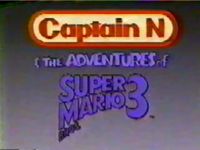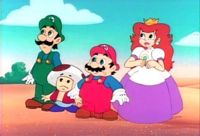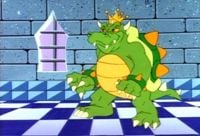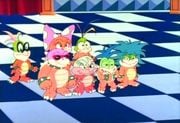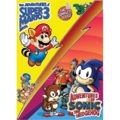The Adventures of Super Mario Bros. 3
Template:Cartoon The Adventures of Super Mario Bros. 3 was the second Mario television cartoon produced by DiC Entertainment, based upon Super Mario Bros. 3. An apparent continuation of The Super Mario Bros. Super Show!, this series served as a bit of a turning point for the DiC version of Mario.
Unlike The Super Mario Bros. Super Show!, which was broadcast five days a week in syndication, The Adventures of Super Mario Bros. 3 was aired on Saturday mornings on NBC, alongside Captain N: The Game Master for the 1990-1991 season. The two shows originally aired in a one-hour package entitled Captain N & The Adventures of Super Mario Bros. 3, which consisted of a half-hour episode of Captain N: The Game Master sandwiched between two fifteen-minute Mario episodes. The two shows were then split up for later airings. The Adventures of Super Mario Bros. 3 was the only animated Mario series to use episode title cards and also the only one to open with a narration instead of a theme song.
While The Super Mario Bros. Super Show! mainly dealt with Mario and Luigi helping Princess Toadstool and Toad trying to stop King Koopa from taking over the Mushroom Kingdom and other lands, The Adventures of Super Mario Bros. 3 took place some time later, after the events of the game, when the Mushroom Kingdom was in a more peaceful state.
As it was based on Super Mario Bros. 3, the feel of the Mushroom Kingdom changed to better resemble the game. The various worlds of Super Mario Bros. 3 were visited regularly, and new Power-Ups such as Super Leaves and Frog Suits appeared. King Koopa also changed his army, losing Wart's minions, but gaining more of his own, including Boom Booms, Boomerang Brothers, Sledge Brothers, Dry Bones, and many more. Although characters continued to call him King Koopa like they did on The Super Mario Bros. Super Show!, his full name, Bowser Koopa, was mentioned in a few episodes.
One notable addition to the cast was Bowser's seven Koopalings, who were given alternate names for the show. Although DIC has never properly explained why different names were issued for the Koopalings, they hadn't been named by Nintendo of America when the show began production. Because they needed names for the characters, the writers had to make up names of their own.
Other locations in the show included Toad's House and the Mushroom Castle, where the protagonists often reside between their adventures. The Koopa family took up residence at Kastle Koopa, located in the heart of Dark Land. In many episodes, the Koopas would use their Doomship to launch their attacks.
The series has been released on DVD by Shout! Factory and MRA Entertainment, as well as the Super Mario World cartoon series.
Back story from The Adventures of Super Mario Bros. 3 writers bible
The Mushroom Kingdom was finally free of King Koopa's tumultuous troublemaking. Mario and Luigi had chased the rascally reptile into a Banishment Zone and sealed the entrance with ten-thousand bricks. Then, after posing for hero statues and being feted with a kingdom-wide gourmet victory feast, our brave plumbers returned home to Brooklyn. But when the peaceful Mushroom People least expected it, King Koopa escaped. Vowing to finally get his villainy right this time, Koopa blasted back to the Mushroom Kingdom in his flying battlewagon, the Doomship, and revealed the wildest, weirdest, wackiest danger any Nintendo world has ever faced: King Koopa's kids. Bully Koopa, Big Mouth Koopa Jr., Kooky von Koopa, Cheatsy Koopa, Kootie Pie Koopa, and the last of the litter, twins Hip and Hop. Now, it was Koopa plus seven Koopalings, and the peaceful Mushroom Kingdom faced seven-hundred times the pandemonium. Princess Toadstool sent an urgent call for help. Only the Super Mario Bros. could stop the royal Koopa and his obnoxious offspring from wreaking their half-baked havoc. And Super Mario 3 [sic], the Super Marios' super mirthful adventures had begun.
Meet the Marios and the Koopas from The Adventures of Super Mario Bros. 3 writers bible
Our stories can start in several ways. First, they can begin with our heroes and heroine: Mario, Luigi, Princess Toadstool and Toad. I.e. they set out to rescue a troubled Mushroom Kingdom citizen, or on a personal quest, and then quickly find their lives complicated by King Koopa and his kids. Or, we can start our stories at Kastle Koopa, when King Koopa announces his latest wicked and wacky scheme, then selects which one of his Koopalings he'll take along as his assistant. Depending on the specific evil talent required for the Koopa caper, à la Mission Impossible. And then it's up to our heroes to stop them.
Since there's never been a more rivalrous group of siblings, the Koopalings clamor to win King Koopa's favor, and sabatoge one another in order to be chosen. When the riot ends, King Koopa and the kid, or kids of his choice, set out to create havoc in all the rich, new levels of the Mushroom Kingdom. From Grass Land to Desert Hill, Water Land to Giant Land, Sky Land to Ice Land, and Pipe Land to Dark Land.
And it's not just the good folk of the Mushroom Kingdom who are in danger. Loading up his giant, flying battlecraft, the Doomship with Koopa Troopas and Paragoombas, King Koopa and his off-the-wall offspring even mount occasional surprise assaults on the un-Mushroom Kingdoms of the Real World's New York City, Hollywood, Fort Knox, London, Paris, or Hong Kong.
If that isn't trouble enough, the Koopa Krew has a whole new assortment of malicious and madcap minions to help them harass our heroes and heroine. Boo Diddleys, pesky ghost heads with big teeth and short tempers. Thwomp, a monumental hunk of menacing rock with the ambition to be Mario's tombstone. Ptooies, mouth-headed mercenaries who spit spiked cannonballs. And Rocky Wrench, a sneaky turtle with severe overbite who hides in manholes and ambushes unsuspecting plumbers.
In every corner of this colorful land, we find appealing three-dimensional personalities, who truly deserve a Mario Bros. rescue. No matter how much we want to laugh at the comedic appearances of our Nintendoish cast, they come complete with hearts, minds, dreams, feelings, and all the indentifiable human conflicts essential to rich storytelling.
Broadcast history
US
- NBC (1990-1991)
- The Family Channel (1992-1993)
- USA Network (1995)
- PAX Network (1999)
UK
- Channel 4 (?-1999)
- The Children's Channel
- Disney Channel UK
- POP! (2004–2010)
- ITV2
Ireland
- RTÉ Two (2001-2003)
AUS and Romania
- Nine Network (1991)
- KidsCo (2009-2014)
Latin América
- Boomerang LA (2005-2006)
Brazil
- Rede Globo (1991)
- Rede Globo (2000-2001)
- Boomerang LA (2005-2006)
Arab World
- Spacetoon (2007-)
Greece
- Vergina TV (2012-)
Opening narration
It is a legend no one will forget.
Everyone thought King Koopa had left the Mushroom Kingdom.
And then... his Doomship attacked!
King Koopa was back!
With the greatest danger ever known...
His Koopa Kids!
Using their new super powers,
The Super Mario Bros. rescued Princess Toadstool,
And beat back the evil Koopa family.
King Koopa: I'll get those plumbers!
Cast
- Walker Boone — Mario
- Tony Rosato — Luigi
- Tracey Moore — Princess Toadstool
- John Stocker — Toad
- Harvey Atkin — King Koopa
- Tara Charendoff — Hip and Hop
- Paulina Gillis — Kootie Pie
- James Rankin — Cheatsy
- Gordon Masten — Bully
- Michael Stark — Kooky
- Dan Hennessey — Big Mouth
- Stuart Stone — (Additional Voices)
- Bonnie Brooks — (Additional Voices)
- Rod Coneybeare — (Additional Voices)
- Diane Fabian — (Additional Voices)
- Catherine Gallant — (Additional Voices)
- Greg Morton — (Additional Voices)
- Jonathan Potts — (Additional Voices)
- Susan Roman — (Additional Voices)
- Linda Sorenson — (Additional Voices)
- Marlow Vella — (Additional Voices)
- Ernie Anderson — (Opening Narration)
Episodes
| Air Date | First Episode | Second Episode |
|---|---|---|
Artistic licenses
- The Koopalings were given different names for the show than the ones they had for the game. Also, some of their cartoon designs deviated from their game artwork a fair bit. In the French dub of the show, King Koopa was regularly referred to as Bowser, and the Koopalings went by their game names. Also a few episodes had King Koopa called by his full name "Bowser Koopa", which is his actual game name.
- Mario, Luigi, Princess Toadstool, Toad and King Koopa retain their designs from The Super Mario Bros. Super Show.
- Although Nintendo had swapped the colors of Mario and Luigi's shirts and overalls by the time Super Mario Bros. 3 was released, DiC never did so in the show as Mario retains the blue shirt and red overalls and Luigi retains the blue shirt and green overalls that appeared in Super Mario Bros. 2 from The Super Mario Bros Super Show. However, the artwork for Shout! Factory DVD set of the show portrays Mario with his current color swap from the later Mario games instead of his old color swap from the cartoon and the early Mario games and Mario's hair color was changed from black to brown since "Princess Toadstool for President".
- There was only one single Airship, which was referred to as the "Doomship".
- Standard Super Leaves grant near-limitless flight power, as if they were P-Wings.
- Kuribo's Shoe is referred to as "Karoobi's Shoe".
- The Mushroom Kingdom and Grass Land are considered one and the same, although in the game, Grass Land is a separate land from the Mushroom Kingdom, and is ruled by its own king. This was likely done because the Mushroom Kingdom didn't actually appear in the game, and the two lands were fairly similar.
- Princess Toadstool received a graphical makeover for the cartoon as her eyes are now black instead of green.
- Mario and Luigi's fire forms resemble their Fire Flower sprites from the NES game in Super Koopa.
Gallery
The Adventures of Super Mario Bros. 3 The Complete Series, and Adventures of Sonic the Hedgehog Volume 1 double pack, released on December 4, 2007 to tie in with Mario & Sonic at the Olympic Games.
Koopas Rock DVD
Names in other languages
*The difference between the Latin American and the Spain re-dub title of the series is this: In Latin America, they are the Super "Mario" Brothers, with Super being an adjective to "Mario" which is their last name, whereas in Spain, they are the "Super Mario" Brothers, with "Super Mario" being sort of their last name. This difference is one of the minor ones between the two dubs, the Spain re-dub having kept many changes and mistakes (particularly regarding to character's names and episode titles) from the Latin American dub, as opposed to the first Spain dub, which went to their own (and more accurate) translation of the English version.
Trivia
- During the credits, a scene of the episode "Sneaky Lying Cheating Giant Ninja Koopas" is shown, where Mario and Luigi hit a giant block. In the episode, the block quickly vanishes when the Bros. hit it. However, in the credits, the block is still there, even after being hit.
- The Swedish, Finnish (1998 dub), and Greek dubs don't have King Koopa saying, "I'll get those plumbers!" at the end of the intro sequence.
- The Italian dub uses an instrumental version of the intro sequence without the opening narration. This also exists on a few episodes for the Brazilian Portuguese dub.
- There were two different Brazilian Portuguese dubs.
See also
Template:BoxTop Template:The Adventures of Super Mario Bros. 3 Template:TAoSMB3 Episodes
